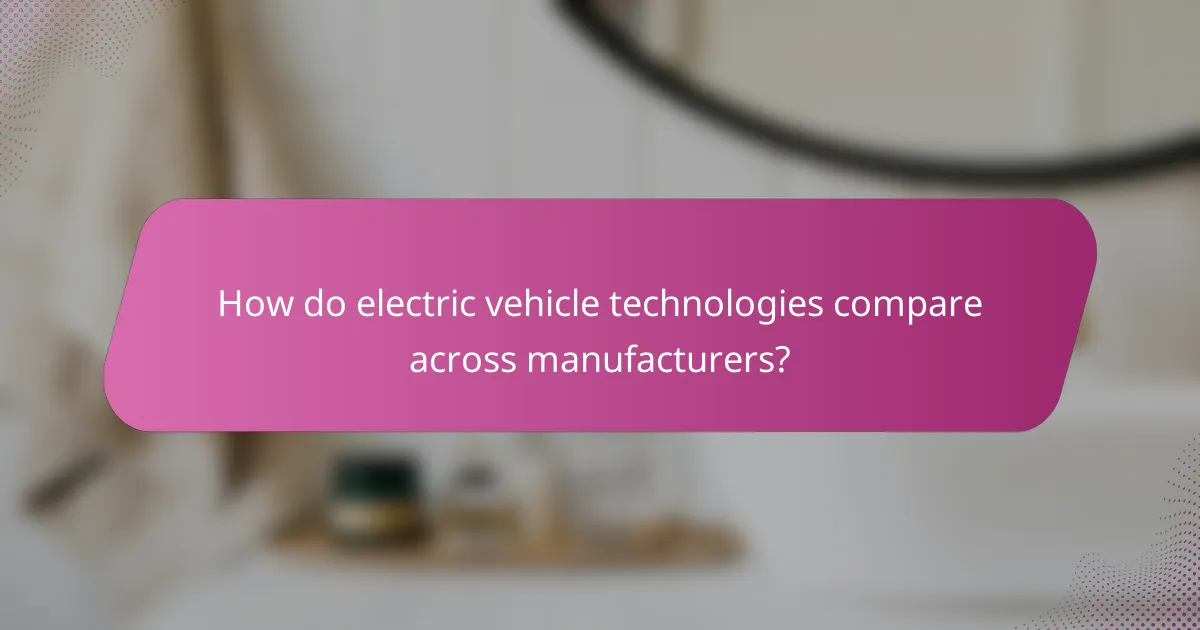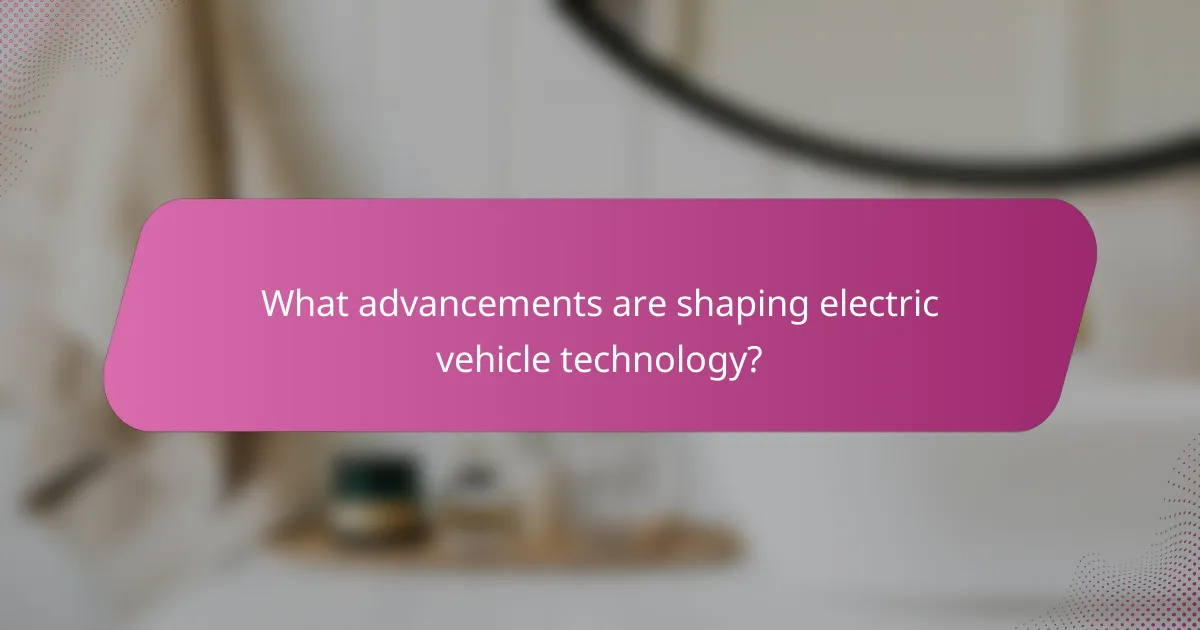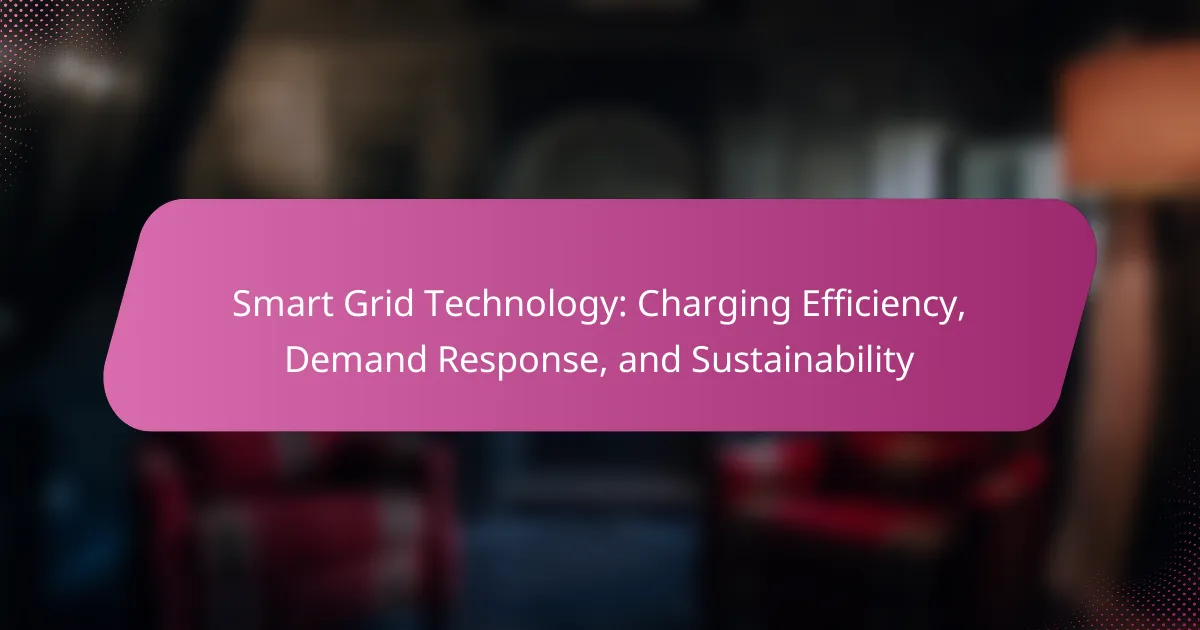As the electric vehicle market continues to evolve, leading manufacturers like Tesla, Ford, Chevrolet, Nissan, and Volkswagen are at the forefront, each presenting distinctive features and technological advancements. Understanding the variations in battery life, charging speed, and performance across these brands is crucial for consumers seeking to make informed choices. Innovations such as solid-state batteries, autonomous driving capabilities, and vehicle-to-grid technology are further transforming the landscape, enhancing both safety and energy efficiency.

What are the leading electric vehicle manufacturers?
The leading electric vehicle manufacturers include Tesla, Ford, Chevrolet, Nissan, and Volkswagen. Each company offers unique features, advancements, and market approaches that cater to different consumer needs and preferences.
Tesla
Tesla is often regarded as the pioneer in the electric vehicle market, known for its innovative technology and extensive charging network. Models like the Model S, Model 3, Model X, and Model Y showcase impressive ranges, advanced autopilot capabilities, and high-performance metrics.
One key aspect of Tesla vehicles is their over-the-air software updates, which continuously improve functionality and add new features. This approach keeps the vehicles up-to-date without requiring a visit to the dealership.
Ford
Ford has made significant strides in the electric vehicle sector with models like the Mustang Mach-E and the F-150 Lightning. The Mustang Mach-E combines sporty performance with practicality, while the F-150 Lightning offers the utility of a traditional truck with electric efficiency.
Ford’s commitment to electric vehicles includes a substantial investment in battery technology and charging infrastructure, making it a strong contender in the EV market. Their vehicles often feature user-friendly technology and a focus on sustainability.
Chevrolet
Chevrolet’s electric vehicle lineup includes the Bolt EV and the upcoming Silverado EV. The Bolt EV is known for its affordability and decent range, making it an attractive option for budget-conscious consumers.
Chevrolet emphasizes practicality and accessibility in its electric offerings, with features like ample cargo space and advanced safety technologies. The brand is also expanding its electric lineup to cater to a broader audience.
Nissan
Nissan has been a key player in the electric vehicle market with its Leaf model, which has been one of the best-selling electric cars globally. The Leaf is recognized for its reliability, affordability, and user-friendly features.
Nissan is also investing in new electric models and technologies, including the Ariya, an electric SUV that aims to compete in the growing electric crossover segment. Their focus on innovation and sustainability is evident in their evolving product offerings.
Volkswagen
Volkswagen is transitioning to electric mobility with its ID. series, including the ID.4 and ID. Buzz. These models reflect Volkswagen’s commitment to sustainability while offering modern design and technology.
The ID.4, an electric SUV, provides a spacious interior and a competitive range, appealing to families and individuals alike. Volkswagen’s strategy includes a robust charging network and plans to expand its electric vehicle lineup significantly in the coming years.

How do electric vehicle technologies compare across manufacturers?
Electric vehicle technologies vary significantly across manufacturers, impacting battery life, charging speed, and overall performance. Understanding these differences can help consumers make informed decisions when selecting an electric vehicle.
Battery technology
Battery technology is crucial for electric vehicles, as it directly affects range and charging times. Most manufacturers use lithium-ion batteries, but variations exist in chemistry and design, influencing energy density and longevity. For instance, some brands may offer solid-state batteries, which promise higher efficiency and safety.
When comparing battery capacities, look for ranges typically between 40 kWh to over 100 kWh, depending on the vehicle model. Higher capacity batteries generally provide longer ranges but can also increase vehicle weight and cost.
Charging infrastructure
Charging infrastructure is essential for the usability of electric vehicles, as it determines how and where vehicles can be recharged. Manufacturers often partner with charging networks to provide access to fast chargers, which can replenish battery levels significantly quicker than standard home chargers.
In the U.S., for example, fast charging stations can deliver up to 80% charge in about 30 minutes, while home chargers may take several hours. It’s important to consider the availability of charging stations in your area and the compatibility of your vehicle with different charging networks.
Performance metrics
Performance metrics such as acceleration, top speed, and handling are vital when comparing electric vehicles. Many electric cars boast impressive acceleration due to instant torque delivery, often achieving 0-60 mph in under 5 seconds for higher-end models.
Additionally, consider factors like regenerative braking, which can enhance efficiency by converting kinetic energy back into stored energy. Evaluating these performance aspects can help determine which electric vehicle aligns best with your driving preferences and needs.

What advancements are shaping electric vehicle technology?
Key advancements in electric vehicle technology include solid-state batteries, autonomous driving features, and vehicle-to-grid technology. These innovations are enhancing performance, safety, and energy management in electric vehicles.
Solid-state batteries
Solid-state batteries represent a significant leap in electric vehicle technology by replacing liquid electrolytes with solid materials. This change can lead to higher energy densities, faster charging times, and improved safety by reducing the risk of leaks and fires.
Manufacturers are exploring various solid-state battery chemistries, such as lithium-sulfur and lithium-metal, which could potentially double the range of electric vehicles compared to traditional lithium-ion batteries. However, production scalability and cost remain challenges that need to be addressed before widespread adoption.
Autonomous driving features
Autonomous driving features are rapidly evolving in electric vehicles, with many manufacturers integrating advanced driver-assistance systems (ADAS). These systems utilize sensors, cameras, and artificial intelligence to enhance safety and convenience, allowing for capabilities like adaptive cruise control and lane-keeping assistance.
While fully autonomous vehicles are still in development, many electric vehicles currently offer semi-autonomous features that can significantly reduce driver workload. It’s essential for consumers to understand the limitations of these systems and remain attentive while driving.
Vehicle-to-grid technology
Vehicle-to-grid (V2G) technology allows electric vehicles to not only draw power from the grid but also return it during peak demand periods. This bidirectional flow of energy can help stabilize the grid and provide financial incentives for EV owners through energy credits.
Implementing V2G technology requires compatible charging infrastructure and regulatory support. As this technology matures, it could play a crucial role in integrating renewable energy sources and enhancing energy resilience in communities.

What features should consumers consider when choosing an electric vehicle?
Consumers should focus on range, safety ratings, and warranty options when selecting an electric vehicle (EV). These features significantly impact the driving experience, long-term reliability, and overall value of the vehicle.
Range and efficiency
Range refers to how far an electric vehicle can travel on a single charge, while efficiency measures how effectively it uses battery power. Most modern EVs offer a range between 150 to 400 kilometers, with higher-end models exceeding this. When choosing, consider your daily driving habits and whether the vehicle’s range meets your needs.
Efficiency is often measured in kilometers per kilowatt-hour (km/kWh). A more efficient vehicle will require less energy for the same distance, which can save on charging costs. Look for models with high efficiency ratings to maximize your driving range and minimize energy expenses.
Safety ratings
Safety ratings are crucial when evaluating electric vehicles, as they indicate how well a car protects its occupants in the event of a collision. Organizations like the National Highway Traffic Safety Administration (NHTSA) and the Insurance Institute for Highway Safety (IIHS) provide ratings based on crash tests and safety features. Aim for vehicles that have received top ratings in these assessments.
In addition to crash test ratings, consider advanced safety technologies such as automatic emergency braking, lane-keeping assist, and adaptive cruise control. These features enhance overall safety and can help prevent accidents, making them valuable additions to any EV.
Warranty and service options
Warranty and service options are essential for ensuring long-term reliability and peace of mind with your electric vehicle. Most manufacturers offer warranties that cover the battery and electric components for at least 8 years or 100,000 kilometers, but this can vary significantly. Check the specifics of the warranty to understand what is covered and for how long.
Additionally, consider the availability of service centers and the manufacturer’s reputation for customer support. A strong service network can make maintenance and repairs more convenient, while a good customer service record can enhance your ownership experience. Look for brands that provide comprehensive support and transparent service policies.

How do electric vehicle prices vary by manufacturer?
Electric vehicle prices can significantly differ among manufacturers due to factors like brand positioning, technology, and features. Generally, premium brands like Tesla command higher prices, while traditional automakers like Ford and Chevrolet offer more budget-friendly options.
Tesla pricing overview
Tesla vehicles are typically priced in the higher range of the electric vehicle market, with models starting from around $40,000 and going up to over $100,000 for luxury variants. The brand’s focus on cutting-edge technology, long-range capabilities, and high performance contributes to these elevated prices.
When considering a Tesla, buyers should evaluate the total cost of ownership, including potential savings on fuel and maintenance, as well as available federal and state incentives that can lower the effective purchase price.
Ford pricing overview
Ford offers a range of electric vehicles, with prices generally starting in the mid-$30,000s for models like the Mustang Mach-E. The company aims to balance affordability with advanced features, making its electric options accessible to a broader audience.
Potential buyers should explore various financing options and incentives, as Ford often participates in programs that can reduce upfront costs, making their electric vehicles more attractive to budget-conscious consumers.
Chevrolet pricing overview
Chevrolet’s electric vehicle lineup, including the Bolt EV, typically starts around $25,000, positioning it as one of the more affordable options in the market. This pricing strategy is designed to appeal to first-time electric vehicle buyers and those looking for economical alternatives.
Chevrolet also offers various incentives and financing options, which can further enhance affordability. Buyers should keep an eye on local and federal rebates that may apply to their purchase, effectively lowering the overall cost.



